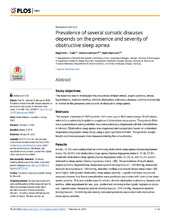Prevalence of several somatic diseases depends on the presence and severity of obstructive sleep apnea
Peer reviewed, Journal article
Published version

View/
Date
2018-02-23Metadata
Show full item recordCollections
Original version
https://doi.org/10.1371/journal.pone.0192671Abstract
Study objectives: The objective was to investigate the prevalence of heart attack, angina pectoris, stroke, hypertension, diabetes mellitus, chronic obstructive pulmonary disease, asthma and obesity in relation to the presence and severity of obstructive sleep apnea. Methods: The sample consisted of 1887 patients, with mean age of 48.6 years (range 16–83 years), referred to a university hospital on suspicion of obstructive sleep apnea. The patients filled out a questionnaire asking whether they were previously diagnosed with the comorbidities in interest. Obstructive sleep apnea was diagnosed and categorized based on a standard respiratory polygraphic sleep study using a type 3 portable monitor. The patients’ weight, height and blood pressure were measured during the consultations. Results: In total, 37.9% were categorized as not having obstructive sleep apnea (Apnea-hypopnea index <5), 29.6% mild obstructive sleep apnea (Apnea-hypopnea index 5–14.9), 17.3% moderate obstructive sleep apnea (Apnea-hypopnea index 15–29.9), and 15.2% severe obstructive sleep apnea (Apnea-hypopnea index ≥30). The prevalence of heart attack, angina pectoris, hypertension, measured systolic blood pressure ≥140 mmHg, measured diastolic blood pressure ≥90 mmHg, diabetes mellitus and obesity (body mass index≥30) were higher with greater obstructive sleep apnea severity. Logistic and linear regression analyses showed that these comorbidities were positively associated with obstructive sleep apnea severity. This was not the case for stroke, chronic obstructive pulmonary disease and asthma. After adjustment for sex, age, alcohol and smoking in the logistic regression analyses, hypertension, measured systolic blood pressure ≥140 mmHg, measured diastolic blood pressure ≥90 mmHg and obesity remained positively associated with obstructive sleep apnea severity. Conclusions: A higher prevalence of heart attack, angina pectoris, hypertension, diabetes mellitus, and obesity was seen with greater obstructive sleep apnea severity. Obesity and hypertension, conditions easy to clinically assess, appear as the most central comorbidities with greater obstructive sleep apnea severity.
